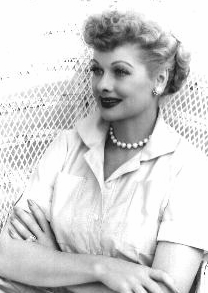
A Guide To I Love Lucy

Lucille Desiree Ball was born in Jamestown, New York on August 6, 1911. She was the oldest child of Henry and Desiree Ball. When Lucy was three years old, Henry died of typhoid fever. Her mother remarried in 1918, to Ed Peterson.
Lucy always had an urge to perform. As a child, she organized the neighborhood children to act out plays, using the family chicken coop for a stage. She once remarked "I can't remember not wanting to perform." Ed arranged for her to act, sing, and dance at his Masonic conventions. And she was often in school plays.
At 14, she entered high school. (Sources disagree on whether it was Jamestown High School or Celoron High School.) She began organizing a dramatic club. She directed and starred in plays and musicals.
At 15, she quit high school, and went to New York City to get a career in show business. She got various jobs as a chorus girl in small theaters. She worked as an artist's model, and became a model for dress designer Hattie Carnegie. Later she was posed as a Chesterfield Cigarette Girl. She struggled for seven years.
By 1933, Ball was 22 years old, and was still no closer to an acting career than she had been seven years earlier when she came to New York. Then one day, Ball was walking with Rose Ruth, one of Carnegie's aides, when they ran into a friend of Rose's, Sylvia Hahlo, an actors agent. Sylvia was impressed with Lucy at various fashion shows. She told Lucy that Samuel Goldwyn at MGM was seeking models and showgirls for the film Roman Scandals, which would star Eddie Cantor. These girls would be added to the Goldwyn Girls, a set of movie showgirls. Ball said that she would think about it.
Then Ball was offered a small, one-day job as a walk-on in the film Broadway Thru A Keyhole (1933). It was her first movie role. Sylvia took shots of her from the film to representatives of MGM in New York. She offered for Ball to become one of the girls in Roman Scandals. Samuel Goldwyn ran tests on her, and he didn't like her at all. But the choreographer of the film, Busby Berkley, did like her, and he hired her anyway. Ball went to Hollywood and appeared in Roman Scandals (1933).
After Roman Scandals, Lucy stayed with the Goldwyn Girls. MGM used her as nothing more than a glamour girl in several Eddie Cantor musical comedies. So she moved to Columbia Pictures. By leaving MGM for Columbia, she was taking a drop in pay, but she decided to risk it. She figured that she could get better roles at Columbia, whereas MGM would continue to use her only in "glamour girl" roles.
Columbia Pictures signed her to a contract as a stock player at $50 a week. She was used mainly in their short subjects. At one point, she played a small role in a Three Stooges short, Three Little Pigskins (1934). Later that year, Columbia dropped her contract. She just walked across the street to RKO Studios, and got a contract there.
Lucy signed with RKO in 1934, and stayed with them until 1942. During these years, she appeared in various movies, mostly B pictures. But she showed a strong talent for comedy, and she worked her way up. She went from being a bit player in 1934 to being a leading actress by 1939. Among her more notable movies at RKO were Stage Door (1937), in which she co-starred with Katherine Hepburn and Ginger Rogers, and Room Service (1938), with the Marx Brothers.
In 1940, she was appearing in a movie called Dance, Girl, Dance. On the set, she met a nightclub entertainer named Desi Arnaz, who was a Cuban immigrant. They appeared in the movie Too Many Girls (1940) together. They fell in love, and married later that year.
In 1942, RKO sold her contract to MGM. Her first film for them was DuBarry Was A Lady. For the role, her hair was dyed an intense bright red, which became her trademark. Her movies were moderately successful.
By 1948, she was unhappy with her film career. She turned to radio, and finally had a hit. She played the starring role in the radio sitcom "My Favorite Husband". She starred as Liz Cooper, a ditzy wife with a habit of getting into scrapes. The show was a hit. CBS wanted to turn it into a TV series. But Lucy said that she wouldn't do it unless Desi co-starred. That led to I Love Lucy.
After Lucy, she and Desi divorced. The next year, she married comedian Gary Morton. In 1962, Ball began a new TV series, The Lucy Show, which lasted until 1968. Then she starred in a third sitcom, Here's Lucy, which lasted until 1974. After that, she retired from acting.
In 1985, she starred in a TV movie called Stone Pillow, a drama about an elderly homeless woman. In 1986, she tried yet another sitcom, Life With Lucy. But this one was cancelled after less than two months.
Ball died in Beverly Hills, California on April 26, 1989. Her body was cremated, and the ashes were interred at the Lake View Cemetery, in Jamestown, New York.
Lucille Ball Desi Arnaz Vivian Vance William Frawley Jerry Hausner
Elizabeth Patterson Doris Singleton Richard Keith Mary Jane Croft Frank Nelson